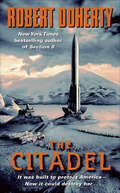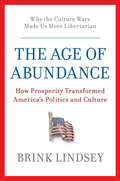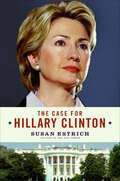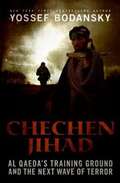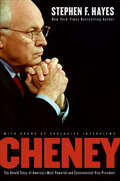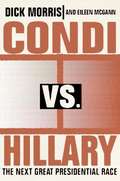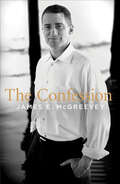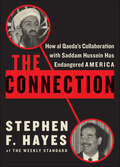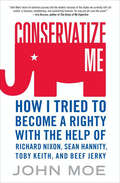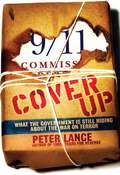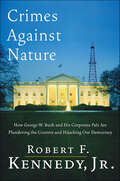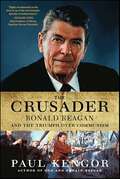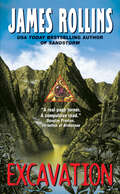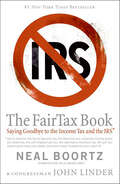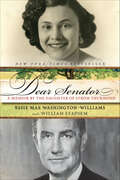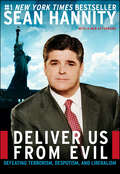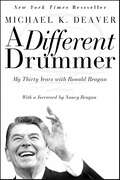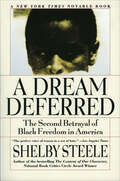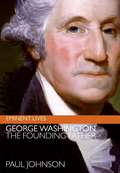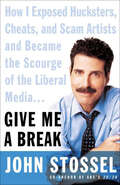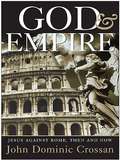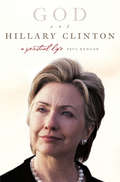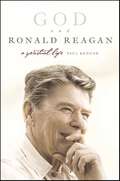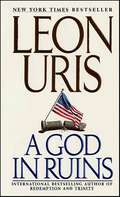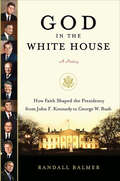- Table View
- List View
The Citadel
by Robert DohertyIt was built to protect America. Now it could destroy the world. A pulse-pounding technothriller from the New York Times–bestselling author of Section 8.At the start of the Cold War, the greatest threat to America wasn’t the Russians and the looming Communist threat. Rather, it was an elite organization bent on world domination, a group so powerful only nuclear weapons could safeguard against them. The CIA knew what these men were capable of, and in a last-ditch attempt to protect America against them, they built two high–security arsenals deep within the earth––one declassified in the Nevada desert, and one heavily under wraps in Antarctica. For over fifty years, no one spoke of The Citadel, the fortress deep under the ice in Antarctica that held the most powerful weapon known to man––until the Organization returned, hellbent on destruction.Captain Jim Vaughn is a government agent known for performing missions no one else wants. So when an old colleague approaches him with an assignment, he can’t refuse––even if the mission has been set in motion by a dead man’s letter, found in Antarctica and dated 1949. The Citadel has been cracked, and the only man who can safeguard it is Vaughn. Nothing short of the fate of mankind rests on his shoulders.
The Age of Abundance: How Prosperity Transformed America's Politics and Culture
by Brink LindseyHow America’s post-WWII affluence led to today’s divide between red states and blue states: “[Lindsey’s] insights are frequently dazzling.” —Los Angeles TimesUntil the 1950s, the struggle to feed, clothe, and employ the nation drove most of American politics. From slavery to the New Deal, political parties organized around economic interests and engaged in fervent debate over the best allocation of agonizingly scarce resources. But with the explosion of the nation’s economy in the years after World War II, a new set of needs began to emerge—a search for meaning and self-expression on one side, and a quest for stability and a return to traditional values on the other.In The Age of Abundance, Brink Lindsey offers a bold reinterpretation of the latter half of the twentieth century. In this sweeping history of postwar America, the tumult of racial and gender politics, the rise of the counterculture, and the conservative revolution of the 1980s and 1990s are portrayed in an entirely new light. Readers will learn how and why the contemporary ideologies of left and right emerged in response to the novel challenges of mass prosperity.The political ideas that created the culture wars, however, have now grown obsolete. Struggling to replace today’s stale conflicts is a new consensus that mixes the social freedom of the left with the economic freedom of the right into a potentially powerful ethos of libertarianism. The Age of Abundance is “a wise, revealing book combining the long sweep of history with a documentarian’s eye for detail” (Dallas Morning News).“Breathtaking analysis . . . pinpoints the current tensions between the political Left and Right to a 1967 San Francisco love-in and the opening of Oral Roberts University, both ‘eruptions of millenarian enthusiasm.’” —Booklist (starred review)“Scintillating.” —The New York Times Book Review“Provocative analysis . . . A thoughtful attempt to explain—and claim—the broad center in the middle of our political squabbling.” —Kirkus Reviews
The Case for Hillary Clinton
by Susan EstrichWith the Bush administration now in its final years, all eyes are turning to the 2008 political season -- especially those of Democratic voters, who are casting about for a galvanizing leader to help them win back the White House.And in that role, argues longtime political strategist Susan Estrich, no candidate even approaches the power and promise of Hillary Rodham Clinton, the senator from New York. She is, by far, not only the most popular Democratic leader in the country, but also one of its most popular and admired politicians, period. Both a passionate spokesperson for progressive values and a strong advocate for our troops overseas, she has used her time in the Senate to establish herself successfully as a genuine political powerhouse. There is no candidate whose election would bring such vitality and lasting change into the White House. And she offers Americans a once-in-a-lifetime chance to break the world's most prominent glass ceiling and elect a female president of the United States.In an atmosphere where conservative Hillary-bashing is still as virulent as ever, Estrich demonstrates all the reasons that this principled leader still blows away any other potential contender in the early polls for 2008. And, with arguments both stirring and sensible, she reminds us that if Hillary should succeed, America and the world would be changed forever and for the better.
Chechen Jihad
by Yossef BodanskyIn this authoritative look at the roots of modern terrorism, Yossef Bodansky, one of the most respected-and best-informed-experts on radical Islamism in the world today, pinpoints the troubled region of Chechnya as a dangerous and little-understood crucible of terror in the struggle between East and West. In his number one New York Times bestseller, Bin Laden: The Man Who Declared War on America, published before 9/11, Bodansky was among the first to introduce American readers to Osama bin Laden. Now in Chechen Jihad he returns to alert American readers to the lessons to be drawn from the terror campaign in Chechnya-and its ramifications for the global war on terrorism. The final years of U.S.-Soviet relations left Chechnya a fertile breeding ground for Islamic terrorism, and in the past decade an uneasy alliance of native Chechen separatists and militant jihadists have joined forces to help al Qaeda and the greater Islamist movement pursue its war against the West. As Bodansky points out, "the Chechens are professional fighters-disciplined and responsible, with a combination of skills, expertise, and character that has made them the most sought-after 'force multipliers' in the jihadist movement." Bodansky traces the secret history of the two Chechen wars, illuminating how the process of "Chechenization" transformed the fight from a secular nationalist struggle into a jihadist holy war against Russia and the secular West. And, in the most instructive message for Western audiences, he reveals how the Chechen rebellion was eventually crippled by a schism between the jihadists and the Chechen people whose nationalist rebellion they had co-opted-an object lesson in the potential vulnerability of Islamist campaigns around the world. Drawing on mountains of previously unseen intelligence from Islamist movements and other military and intelligence sources from throughout the Middle East and Central Asia, as well as senior officials in many of the affected nations, Chechen Jihad offers an intimate and startling portrait of the jihadist movement that is astonishing in its detail and chilling in its implications-but one that points to a new way forward in the struggle to answer the challenges of international Islamist terrorism.
Cheney: The Untold Story of America's Most Powerful and Controversial Vice President
by Stephen F. Hayes“A vivid portrait” of the U.S. politician’s career, from a 1968 congressional fellowship to George W. Bush’s vice president (Publishers Weekly).During a forty-year career in politics, Vice President Dick Cheney has been involved in some of the most consequential decisions in recent American history. He was one of a few select advisers in the room when President Gerald Ford decided to declare an end to the Vietnam War. Nearly thirty years later, from the presidential bunker below the White House in the moments immediately following the attacks of September 11, 2001, he helped shape the response: America’s global war on terror.Yet for all his influence, the world knows very little about Dick Cheney. The most powerful vice president in U.S. history has also been the most secretive and guarded of all public officials. “Am I the evil genius in the corner that nobody ever sees come out of his hole?” Cheney asked rhetorically in 2004. “It’s a nice way to operate, actually.”Now, in Cheney: The Untold Story of America’s Most Powerful and Controversial Vice President, New York Times–bestselling author and Weekly Standard senior writer Stephen F. Hayes offers readers a groundbreaking view into the world of this most enigmatic man. Having had exclusive access to Cheney himself, Hayes draws upon hundreds of interviews with the vice president, his boyhood friends, political mentors, family members, reticent staffers, and senior Bush administration officials, to deliver a comprehensive portrait of one of the most important political figures in modern times.The wide range of topics Hayes covers includes Cheney’s withdrawal from Yale; his early run-ins with the law; the incident that almost got him blackballed from working in the Ford White House; his meteoric rise to congressional leadership; his opposition to removing Saddam Hussein from power after the first Gulf War; the solo, cross-country drive he took after leaving the Pentagon; his selection as Bush's running mate; his commanding performance on 9/11; the aggressive intelligence and interrogation measures he pushed in the aftermath of those attacks; the necessity of the Iraq War; the consequences of mistakes made during and after that war; and intelligence battles with the CIA and their lasting effects. With exhaustive reporting, Hayes shines a light into the shadows of the Bush administration and finds a very different Dick Cheney from the one America thinks it knows.
Condi vs. Hillary
by Dick Morris Eileen McgannWho will be president in 2008? Many believe that the White House is Hillary Clinton's to lose. As long-time strategists Dick Morris and Eileen McGann reveal in Condi vs. Hillary, however, Hillary's plans for higher office are vulnerable to a challenge from a most unexpected quarter: the Bush administration's secretary of state and former national security advisor, Condoleezza Rice. Rice is the only figure on the national scene who has the credentials, the credibility, and the charisma to lead the GOP in 2008. And, as this first book on the subject demonstrates, a race between these two commanding, but very different, women is a very real possibility -- and would inevitably prove one of the most fascinating and important races in American history. Blending insider insight and political foresight, Condi vs. Hillary surveys the strengths and weaknesses of the two candidates, finding persuasive clues about what we might expect from each of them as a chief executive. It traces their very different childhoods -- Hillary Rodham's in unchallenging suburban comfort, Condi Rice's in Birmingham, Alabama, during the civil rights era -- and finds in each the roots of their latter-day selves. It explores their career in public life -- Hillary's as an ambitious liberal who attached herself to a governor on the rise, Condi's as a woman of broad and deep talents who has earned her own way. It turns a discerning eye on how each has spent her time in government, contrasting Condi's growth and maturation in office with Hillary's record of underachievement as both first lady and senator from New York. And it reveals how a draft-Condi movement could sweep the secretary of state into the presidency even as she forgoes campaigning to address her responsibilities as secretary of state. America, in short, may be on the verge of a perfect storm of twenty-first-century politics, pitting two of America's most popular -- and controversial -- women against each other, and offering Americans a choice between fulfilling the ambitions of one of our most polarizing figures . . . or changing history by electing not just the first woman, but also the first African American woman, to lead the free world into the future.
The Confession
by James E. McGreevey“An astonishingly candid memoir...brave and powerful.” — Newsweek
The Connection: How al Qaeda's Collaboration with Saddam Hussein Has Endangered America
by Stephen F. HayesIn the wake of 9/11 no one knew when the next attack would come, or where it would come from. America's enemies seemed gathered on all sides, and for several nerve-racking months, we lived in fear that the perpetrators might be plotting another action or, worse, that our most dangerous enemies -- al Qaeda and Saddam Hussein's murderous regime in Iraq -- could be banding together against us.The Bush administration and CIA director George Tenet warned against complacency and pointed to growing indications that al Qaeda and Iraq were in league. But their case was undercut by unnamed intelligence officials, skeptical politicians, and a compliant media. So America relaxed. A comforting consensus settled in: Osama bin Laden was an impassioned fundamentalist, Saddam a secular autocrat. The two would never, could never, work together. ABC News reported that there was no connection between them, and the New York Times said so too, and pretty soon just about everyone agreed.Just about everyone was wrong.In The Connection, Stephen Hayes draws on CIA debriefings, top-secret memos from our national intelligence agencies, and interviews with Iraqi military leaders and Washington insiders to demonstrate that Saddam and bin Laden not only could work together, they did -- a curious relationship that stretches back more than a decade and may include collaboration on terrorist acts, chemical-weapons training, and sheltering some of the world's most wanted radicals.Stephen Hayes's bombshell Weekly Standard piece on this topic was cited by Vice President Cheney as the "best source of information" about the Saddam-al Qaeda connections. Now Hayes delves even deeper, exposing the inner workings of America's deadliest opponents and providing a clear-eyed corrective to reams of underreported, politicized, and just plain wrong information.The Connection is both a gripping snapshot of the War on Terror and a case study in how bureaucratic assumptions and media arrogance can put us all at risk.
Conservatize Me: How I Tried to Become a Righty with the Help of Richard Nixon, Sean Hannity, Toby Keith, and Beef Jerky
by John MoeIt has been said that everyone in America is firmly planted in red or blue—permanently conservative or irreversibly liberal. But are we all really that locked in to the left or the right? A lifelong liberal, John Moe was determined to find out. So he reset his radio dials from NPR to Rush Limbaugh, joined some of today's most influential conservative thinkers for a series of "conversion sessions," made pilgrimages to the Ronald Reagan and Richard M. Nixon museums, and spent the Fourth of July in the most Bush-friendly county in the country, in an attempt to discover if there was actually a conservative trapped inside him yearning to be set free.Conservatize Me is a fresh, humorous, and highly entertaining look at our country's political landscape, one that will strike a powerful chord with millions of disgruntled Americans while stimulating the mind and tickling the funny bone.
Cover Up: What the Government Is Still Hiding About the War on Terror
by Peter LanceEver since 9/11, investigative reporter Peter Lance has been leading the fight to expose the intelligence gaps that led to 9/11. Now, in the follow-up to his bestselling 1000 Years for Revenge, he returns with devastating new evidence that the government has been covering up its own counterterror failures since the mid-1990s -- and continues today.In Cover Up, Lance shows how the government chose again and again to sacrifice America's national security for personal motives and political convenience. In its first half, he unveils shattering new evidence that terror mastermind Ramzi Yousef ordered the bombing of TWA 800 from his prison cell in order to effect a mistrial in his own terror bombing case. Astonishingly, the FBI was alerted to Yousef's plans in advance by a prison informant who even passed along his detailed sketch of a bomb-trigger device -- a document seen here for the first time. And Lance reveals the shocking reason the Justice Department suddenly ruled the crash anaccident despite overwhelming evidence of the bombing -- throwing away its best chance to penetrate the cell that was already planning 9/11.And the outrage doesn't stop there. In Part II, Lance offers an unofficial "minority report" on the 9/11 Commission, critiquing it as the incomplete, highly politicized "Warren Commission of our time." He explores potential conflicts of interest among its members, from the staff director who wrote a book with Condoleezza Rice, to the former Clinton deputy attorney general who participated in a critical meeting that upended the TWA probe. He exposes the report's false contention that the 9/11 plan was conceived in 1996, when the FBI had knowledge that the plot was in motion as early as 1994. And, in a heart-stopping, minute-by-minute chronicle of the attacks, he asks dozens of unanswered questions about the defense failures of that day -- from why fighter jets weren't scrambled for almost an hour after the hijackings, to why the president and several of his top military advisers remained virtually incommunicado for more than half an hour after it was clear that America was under attack.At a time when America feels no safer than ever, Cover Up will lend new eyes to readers who want the full story behind the 9/11 attacks -- and inspire us all to keep demanding the truth.
Crimes Against Nature: How George W. Bush and His Corporate Pals Are Plundering the Country and Hijacking Our Democracy
by Robert F. Kennedy Jr.Crimes against Nature reveals the hidden history behind three of the nation's first parklands: the Adirondacks, Yellowstone, and the Grand Canyon. Focusing on conservation's impact on local inhabitants, Karl Jacoby traces the effect of criminalizing such traditional practices as hunting, fishing, foraging, and timber cutting in the newly created parks. Jacoby reassesses the nature of these "crimes" and provides a rich portrait of rural people and their relationship with the natural world in the late nineteenth and early twentieth centuries.
The Crusader: Ronald Reagan and the Fall of Communism
by Paul KengorBased on extraordinary research: a major reassessment of Ronald Reagan's lifelong crusade to dismantle the Soviet Empire–including shocking revelations about the liberal American politician who tried to collude with USSR to counter Reagan's efforts Paul Kengor's God and Ronald Reagan made presidential historian Paul Kengor's name as one of the premier chroniclers of the life and career of the 40th president. Now, with The Crusader, Kengor returns with the one book about Reagan that has not been written: The story of his lifelong crusade against communism, and of his dogged–and ultimately triumphant–effort to overthrow the Soviet Union. Drawing upon reams of newly declassified presidential papers, as well as untapped Soviet media archives and new interviews with key players, Kengor traces Reagan's efforts to target the Soviet Union from his days as governor of California to the fall of the Berlin Wall and the collapse of what he famously dubbed the "Evil Empire." The result is a major revision and enhancement of what historians are only beginning to realize: That Reagan not only wished for the collapse of communism, but had a deep and specific understanding of what it would take––and effected dozens of policy shifts that brought the USSR to its heels within a decade of his presidency. The Crusader makes use of key sources from behind the Iron Curtain, including one key memo that implicates a major American liberal politician–still in office today–in a scheme to enlist Soviet premier Yuri Andropov to help defeat Reagan's 1984 reelection bid. Such new finds make The Crusader not just a work of extraordinary history, but a work of explosive revelation that will be debated as hotly in 2006 as Reagan's policies were in the 1980s.
Excavation: A Novel
by James Rollins“A real page-turner….Rollins keeps the story in overdrive, with plenty of twists and turns before the final shocker.”—Douglas Preston, co-author of The Monster of Florence A classic adventure from James Rollins, the author of The Doomsday Key, The Last Oracle, The Judas Strain, Black Order, and other pulse-pounding, New York Times bestselling thrillers, Excavation carries readers deep into the jungles of South America, and into the terrifying heart of dark mysteries that should never be unearthed.
The Fair Tax Book: Saying Goodbye to the Income Tax and the IRS
by Neal Boortz John LinderWouldn’t you love to abolish the IRS . . .Keep all the money in your paycheck . . .Pay taxes on what you spend, not what you earn . . .And eliminate all the fraud, hassle, and waste of our current system? Then the FairTax is for you. In the face of the outlandish American tax burden, talk-radio firebrand Neal Boortz and Congressman John Linder are leading the charge to phase out our current, unfair system and enact the FairTax Plan-replacing the federal income tax and withholding system with a simple 23 percent retail sales tax. This dramatic revision of the current system, which would eliminate the reviled IRS, has already caught fire in the American heartland, with more than 600,000 taxpayers signing on in support of the plan. As Boortz and Linder reveal in this first book on the FairTax, this radical but eminently sensible plan would end the annual national nightmare of filing income tax returns, while at the same time enlarging the federal tax base by collecting sales tax from every retail consumer in the country. The FairTax, they argue, would transform the fearsome bureaucracy of the IRS into a more transparent, accountable—and equitable—tax collection system. Endorsed by scores of leading economists—and supported by a huge and growing grassroots movement—the FairTax Plan could revolutionize the way America pays for itself.
Dear Senator: A Memoir by the Daughter of Strom Thurmond
by William Stadiem Essie Mae Washington-WilliamsIn this historically momentous memoir, the segregationist senator&’s mixed-race daughter speaks out about her life in the shadows. Breaking nearly eight decades of silence, Essie Mae Washington–Williams comes forward with the dramatic story of her life. Her father, the late Strom Thurmond, had been the nation&’s leading proponent of racial segregation. He famously undertook a twenty-four–hour filibuster against the Civil Rights Act of 1957, a desperate attempt to save the South from &“mongrelization&”. Her mother, however, was a black teenager named Carrie Butler who worked as a maid on the Thurmond family&’s South Carolina plantation. Set against the explosive civil rights era, this poignant memoir recalls how Essie Mae struggled with the discrepancy between the generous and even affectionate father she knew privately, and the Old Southern politician, railing against greater racial equality, who refused to acknowledge her publicly. From her richly told narrative, as well as the letters she and Thurmond wrote to each other over the years, emerges a fascinating portrait of a father who counseled and supported his daughter, yet would not break with the values of his Dixiecrat constituents.
Deliver Us from Evil: Defeating Terrorism, Despotism, and Liberalism
by Sean HannityNearly three years have passed since that tragic day in September. Since then, our wounds have healed, but our senses and memories have dulled.At first, the nation rallied behind its leader. But by the time the confrontation with Iraq presented itself, our courage and moral certainty seemed to fade in the face of partisan bickering and posturing.Now the political left and the Democratic Party are trying to use the demanding aftermath of the war to exploit our national cause for their own political advantage.How could we allow ourselves to forget so soon?--from Deliver Us from EvilSean Hannity's first blockbuster book, the New York Times bestseller Let Freedom Ring, cemented his place as the freshest and most compelling conservative voice in the country. As the host of the phenomenally successful Hannity & Colmes on the Fox News Channel and The Sean Hannity Show on ABC Radio, Hannity has won a wildly devoted fan base. Now he brings his plainspoken, take-no-prisoners style to the continuing War on Terror abroad -- and liberalism at home -- in Deliver Us from Evil."Evil exists," Hannity asserts. "It is real, and it means to harm us." And in these pages he revisits the harsh lessons America has learned in confronting evil in the past and the present, to illuminate the course we must take in the future. Tracing a direct line from Adolf Hitler and Joseph Stalin through Saddam Hussein and Osama bin Laden, he reminds us of the courage and moral clarity of our great leaders. And he reveals how the disgraceful history of appeasement has reached forward from the days of Neville Chamberlain and Jimmy Carter to corrupt the unrepentant leftists of the modern Democratic Party -- from Howard Dean and John Kerry to Bill and Hillary Clinton.As Americans face the ongoing war against terrorists and their state sponsors around the world, Sean Hannity reminds us that we must also cope with the continuing scourge of accommodation and cowardice at home. With his trademark blend of passion and hard-hitting commentary, he urges Americans to recognize the dangers of putting our faith in toothless "multilateralism" when the times call for decisive action. For only through strong defense of our freedoms, at home and around the world, can we preserve America's security and liberty in the dangerous twenty-first century.
A Different Drummer: My Thirty Years with Ronald Reagan
by Michael K. DeaverThe New York Times bestselling memoir of Ronald Reagan by his longtime aide and friend"These are memories of a friend and they span over the 35 years that I have known and loved Ronald and Nancy Reagan. Primarily anecdotal, there will be no footnotes, simply my best efforts to reconstruct these years and what they have meant to me."--Michael DeaverRONALD REAGAN AND ME will be comprised of six parts:The Early Years: Deaver and his first meeting with Reagan during his campaign for governor of California in 1966. His first impressions of Reagan's his management style, media savvy and incredible ability to communicate.Reagan: The Man: A look at the traits that make the man: perfectionist, competitor, unwavering discipline, and a deep sense of purpose and destiny.Sincerely, Ronald Reagan: Never-before-published excerpts from letters Reagan wrote to people of various backgrounds.The Campaigner: On the stump during the presidential campaigns.Mr. President: Reagan in action in the Oval Office. How he changed after he was shot, and his battles with Congress and Communism.The Long Goodbye: With Nancy's cooperation, a look at the Reagans' struggle with Alzheimers and the impact it has had on their marriage and the family.
A Dream Deferred: The Second Betrayal of Black Freedom in America
by Shelby SteeleAward-winning author Shelby Steele’s essay collection A Dream Deferred reveals the untold story behind the polarized racial politics in America today. A New York Times Notable BookThrough thought-provoking insights, National Book Critics Circle Award Winner Shelby Steele argues that a second betrayal of black freedom in the United States—the first one being segregation—emerged from the civil rights era when the country was overtaken by a powerful impulse to redeem itself from racial shame. According to Steele, 1960s liberalism had as its first and all-consuming goal the expiation of American guilt rather than the careful development of true equality between the races. In four densely argued essays, Steele takes on the familiar questions of affirmative action, multiculturalism, diversity, Afro-centrism, group preferences, victimization—and what he deems to be the atavistic powers of race, ethnicity, and gender, the original causes of oppression. A Dream Deferred is an honest, courageous look at the perplexing dilemma of race and democracy in the United States—and what we might do to resolve it.“Steele has given eloquent voice to painful truths that are almost always left unspoken in the nation’s circumscribed public discourse on race.” —New York Times“Steele’s skill compares with that of James Baldwin, Richard Wright, or Frederick Douglass.” —Chicago Tribune“Sweeping in its formulations . . . Perceptive . . . Steele is a clever critic.” —Los Angeles Times Book Review“Deeply engaging public-policy criticism.” —Booklist
George Washington: The Founding Father
by Paul JohnsonBy far the most important figure in the history of the United States, George Washington liberated the thirteen colonies from the superior forces of the British Empire against all military odds, and presided over the production and ratification of a constitution that (suitably amended) has lasted for more than two hundred years. Yet today Washington remains a distant figure to many Americans--a failing that acclaimed author Paul Johnson sets out to rectify with this brilliantly vivid, sharply etched portrait of the great hero as a young warrior, masterly commander in chief, patient lawmaker, and exceptionally wise president.
Give Me a Break: How I Exposed Hucksters, Cheats, and Scam Artists and Became the Scourge of the Liberal Media...
by John Stossel“Immensely thought-provoking,”* Emmy Award–winning TV presenter John Stossel’s Give Me a Break exposes the hypocrisy and corruption of the U.S. government.Working as a correspondent for 20/20 and Good Morning America, John Stossel confronted dozens of scam artists: from hacks who worked out of their basements to some of America’s most powerful executives and leading politicians. His efforts shut down countless crooks—both famous and obscure. Then he realized what the real problem was.In Give Me a Break, Stossel takes on the regulators, lawyers, and politicians who thrive on our hysteria about risk and deceive the public in the name of safety. Drawing on his vast professional experience (as well as some personal ones), Stossel presents an engaging, witty, and thought-provoking argument about the beneficial powers of the free market and free speech.“Powerful, well-argued.” —*Booklist
God and Empire
by John Dominic CrossanAt the heart of the Bible is a moral and ethical call to fight unjust superpowers, whether they are Babylon, Rome, or even America. From the divine punishment and promise found in Genesis through the revolutionary messages of Jesus and Paul, John Dominic Crossan reveals what the Bible has to say about land and economy, violence and retribution, justice and peace, and, ultimately, redemption. In contrast to the oppressive Roman military occupation of the first century, he examines the meaning of the non-violent Kingdom of God prophesized by Jesus and the equality advocated by Paul to the early Christian churches. Crossan contrasts these messages of peace with the misinterpreted apocalyptic vision from the Book of Revelation, which has been misrepresented by modern right-wing theologians and televangelists to justify U.S. military actions in the Middle East. In God and Empire Crossan surveys the Bible from Genesis to Apocalypse, or the Book of Revelation, and discovers a hopeful message that cannot be ignored in these turbulent times. The first-century Pax Romana, Crossan points out, was in fact a "peace" won through violent military action. Jesus preached a different kind of peace--a peace that surpasses all understanding--and a kingdom not of Caesar but of God. The Romans executed Jesus because he preached this Kingdom of God, a kingdom based on peace and justice, over the empire of Rome, which ruled by violence and force. For Jesus and Paul, Crossan explains, peace cannot be won the Roman way, through military victory, but only through justice and fair and equal treatment of all people.
God and Hillary Clinton: A Spiritual Life
by Paul KengorFor nearly three decades political observers have sought to understand the complex relationship between Hillary Clinton's faith and her politics. Now, in this first spiritual biography of the former first lady, acclaimed historian Paul Kengor sets out to answer the elusive question: What does Hillary Clinton believe? Based on exhaustive research, God and Hillary Clinton tells the surprising story of Hillary's spiritual evolution, detailing the interaction between her lifelong religious beliefs and her personal history that has made her the politician she is today. Offering an in-depth spiritual chronology of Clinton's life, author Paul Kengor also analyzes the fraught relationship between her faith and her secular policies--most notably how she reconciles her pro-choice stance on abortion with her Christian beliefs--and scrutinizes how these policies have changed over the course of her political career. What emerges is an unexpected portrait of a political figure whose ideals have been shaped by both the power of her politics and the depth of her religious devotion.
God and Ronald Reagan: A Spiritual Life
by Paul KengorRonald Reagan is hailed today for a presidency that restored optimism to America, engendered years of economic prosperity, and helped bring about the fall of the Soviet Union. Yet until now little attention has been paid to the role Reagan's personal spirituality played in his political career, shaping his ideas, bolstering his resolve, and ultimately compelling him to confront the brutal -- and, not coincidentally, atheistic -- Soviet empire.In this groundbreaking book, political historian Paul Kengor draws upon Reagan's legacy of speeches and correspondence, and the memories of those who knew him well, to reveal a man whose Christian faith remained deep and consistent throughout his more than six decades in public life. Raised in the Disciples of Christ Church by a devout mother with a passionate missionary streak, Reagan embraced the church after reading a Christian novel at the age of eleven. A devoted Sunday-school teacher, he absorbed the church's model of "practical Christianity" and strived to achieve it in every stage of his life.But it was in his lifelong battle against communism -- first in Hollywood, then on the political stage -- that Reagan's Christian beliefs had their most profound effect. Appalled by the religious repression and state-mandated atheism of Bolshevik Marxism, Reagan felt called by a sense of personal mission to confront the USSR. Inspired by influences as diverse as C.S. Lewis, Whittaker Chambers, and Aleksandr Solzhenitsyn, he waged an openly spiritual campaign against communism, insisting that religious freedom was the bedrock of personal liberty. "The source of our strength in the quest for human freedom is not material, but spiritual," he said in his Evil Empire address. "And because it knows no limitation, it must terrify and ultimately triumph over those who would enslave their fellow man."From a church classroom in 1920s Dixon, Illinois, to his triumphant mission to Moscow in 1988, Ronald Reagan was both political leader and spiritual crusader. God and Ronald Reagan deepens immeasurably our understanding of how these twin missions shaped his presidency -- and changed the world.
A God in Ruins
by Leon UrisA presidential candidate is unaware he holds a secret that could endanger him and his country in this explosive political novel. “Great reading. . . . Uris mixes politics, history, love and people’s passions into yet another bestseller. . . . Compelling.” —Tulsa WorldSpanning the decades from World War II to the 2008 presidential campaign, A God in Ruins is the riveting story of Quinn Patrick O’Connell, an honest, principled, and courageous man on the brink of becoming the second Irish Catholic President of the United States. But Quinn is a man with an explosive secret that can shatter his political ambitions, threaten his life, and tear the country apart—a secret buried for over a half century—that even he does not know . . . “As exciting as Exodus, Topaz, and MILA 18.” —Dallas Morning News“Vintage Uris.” —Lancaster (PA) Sunday News
God in the White House: A History
by Randall Herbert BalmerHow did we go from John F. Kennedy declaring that religion should play no role in the elections to Bush saying, "I believe that God wants me to be president"?Historian Randall Balmer takes us on a tour of presidential religiosity in the last half of the twentieth century—from Kennedy's 1960 speech that proposed an almost absolute wall between American political and religious life to the soft religiosity of Lyndon B. Johnson's Great Society; from Richard Nixon's manipulation of religion to fit his own needs to Gerald Ford's quiet stoicism; from Jimmy Carter's introduction of evangelicalism into the mainstream to Ronald Reagan's co-option of the same group; from Bill Clinton's covert way of turning religion into a non-issue to George W. Bush's overt Christian messages, Balmer reveals the role religion has played in the personal and political lives of these American presidents.Americans were once content to disregard religion as a criterion for voting, as in most of the modern presidential elections before Jimmy Carter.But today's voters have come to expect candidates to fully disclose their religious views and to deeply illustrate their personal relationship to the Almighty. God in the White House explores the paradox of Americans' expectation that presidents should simultaneously trumpet their religious views and relationship to God while supporting the separation of church and state. Balmer tells the story of the politicization of religion in the last half of the twentieth century, as well as the "religionization" of our politics. He reflects on the implications of this shift, which have reverberated in both our religious and political worlds, and offers a new lens through which to see not only these extraordinary individuals, but also our current political situation.
